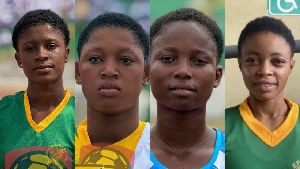A little girl accosts her expectant mother with the question: How did you get a bloated belly? Confused, the mother throws suspicious looks about her, searching for superimposed silhouettes of model answers dancing dulcetly against the clammy emptiness engulfing her and her little daughter. There is none however, no visible answer, with silence eventually swallowing up the clammy emptiness. The expectant mother returns her daughter’s prying stare. The little girl in turn looks bashfully away, staring blankly in the dark expanse of her mother’s face. “How did you get a bloated belly?” she repeats.
Silence!
It turns out the little girl’s expectant mother has never been confronted with a pregnant question as weighty and grave as her little daughter’s mind. Nevertheless silence has never been a concrete barrier to smooth filial intercourse. What must have been the cause of silence then? Philosophical weight of the question, maybe! The little girl’s grimaced face directs itself toward her mother’s, with the latter strategically feigning a wry countenance at the former’s angelic innocence. “You see,” the little girl’s expectant mother begins, “I ate garri and water!” This straight answer does not seem to sit well with the little girl. Reasons? She herself has eaten garri and water from time to time with no visible stomach protuberance hanging about her person.
Strangely nature has a way of discriminating between and among her creations. Garri and water? Could the “virgin” mothers of Buddha and Jesus Christ have been beneficiaries of garri-and-water ingestion? How strange? Garri and water potentially induce gastric distension in the anatomy of one human being, the expectant mother, but not in another, the little girl. Strangeness is nature indeed. Where is the source of nature’s strangeness? Is it physiological age? Is it biological age? Does chronological age have anything to do with nature’s discriminating predispositions? Buddha and Jesus may not have direct answers for us this day and time. Accordingly, nature’s little girl has no ready-made answers either. Philosophical nosiness is one of her métiers nonetheless. Thus her edificial innocence is merely a calculating disguise. “How about father’s bloated belly?” asks she, subconsciously not knowing if her father is a victim of couvade or sympathetic pregnancy.
Of an answer, another slice of silence and clammy emptiness mix up in her cranial cosmic soup of angelic curiosity. Soon three of the expectant mother’s other children, part of her loveable quadruplets, crowd around her. They have been closely listening in to their mother’s and sibling’s conversation, wanting to know if their mother’s garri-and-water addiction has any direct relation to her wide hips and protruding behind. “Yes,” the expectant mother replies, adding: “Garri-and-water is the secret of holy secrets!” These simple anecdotes somehow capture the complicated rhythm and emotional tenor of politics, particularly Ghana’s. Significantly carnage knowledge switches hands with garri-and-water in fleeting seconds. Filial subordination ultimately becomes the condiment of relational recipe for expectant mother and children.
That is not surprising in the scheme of relational socialization. The Machiavellianism of Mr. Politics, the quadruplets’ expectant mother, has had a divisive nature right from the start of Biblical chronology, supposedly, between God and the Devil, with one accusing the other of the politics of seniority or of the politics of juniority. Mr. Politics is technically politics of mutual distrust, of mutual mistrust. But politics has had a longer history than the emotional novelty of Biblical chronology. Politics is not a linear function of chronology. What is it then? Politics is circular among other characteristics, embodying every aspect of human life, the nuances and subtleties of human psychologization, in philosophic and spiritual totality. Politics is thus science, religion, music, romance, sports, technology, education, mythology, culture, everything! For one thing, politics is even of life as it is of death. For another, the circularity of politics puts it on a par with the philosophical culturalilty of Sankofa!
Preferably, the philosophical culturalilty of Sankofa points to the totality of man’s existential realities, running the length and breadth of life and death. Life and death add up to the mystery of human psychologization. Is the emotional circularity of Ghana’s brand of politics “politics of life” or “politics of death?” This question is an excellent one for the vindictive, cartoonish hide-and-seek politics of cat and mouse. It is still, however, not too evident yet which of Ghana’s two major political parties should assume the cartoonish characterology of “cat” or “mouse.” Besides, knowing which is which may go a long way to delineate a clear philosophical cleavage between “politics of life” and “politics of death.” It does also appear no intervening ideological sympathy enjoys definitive lodgment between the two major neocolonial partisan political polarities, the NDC and the NPP. This contention is not necessarily right, since no virtual empty space is actually technically physically “empty.”
That virtual empty space is ideologically taken up by a partisan political sandwich, the CPP, whose gifted leaders and dedicated members are scattered like splinters of wood in the emotional whirlpool of Ghanaian politics. Personal ambition, petty intra-party ideological bickering, injunctive imposition on the CPP from active partisan politics, spiteful falsehoods spread around the political personality of the CPP down the years, personality conflicts, and the reinforced sinister hand of neocolonialism have corporately conspired to disenable the CPP. Even so, these scheming justifications should not render the CPP philosophically irrelevant in modern Ghanaian politics. The CPP still has a lot to offer. The cardinal idea here is harnessing the best of human spiritual gifts and making good use of the wide range of human intellectual possibilities to satisfy that part of man’s innate drive for the noble claims of human dignity. Both the NDC and the NPP appear to have failed Ghanaians in this regard.
However, our contentious proposition does not impute an exclusivity of ideological perfection to the CPP. It is the case that political organizations are fundamentally human and therefore subject to parallel infusions of man’s fallibility. On the other hand, it may appear the CPP’s sympathies for communitarianism and democratic socialism stand a better chance of improving human and race relations than capitalism and its philosophical cognate, exploitation theory. We are not in any way making sentimental pontifications about utopian socialism and utopian capitalism. Those two do not exist anywhere. Neither are we preoccupied with the comparative strengthens and weaknesses of socialist ideals and capitalist exploitation. Clearly we face the same moral dilemma as Mr. Politics’. How does a conservative mother honestly tell her children how pregnancy is made through carnal knowledge without necessarily coming across as rhetorically profane?
The problematic of conscious falsification is here again. Can lying ever be synonymous with honesty in any given instance, as Abraham surely lied to Pharaoh claiming Sarah as his sister rather than his wife? Is a piece of righteous lie, Abraham’s, or Platonic noble lie worth replicating in Ghanaian politics? Yet the moral of the foregoing is equally not far removed from the example of a rash individual who desires to retrieve a piece of diamond from behind the back of a live tiger’s teeth without being eaten up in the process. Any useful alternatives? What if the live tiger in question had been subjected to suspended animation? The question is far from practical consideration when animal biology at the time did not enjoy the level of scientific sophistication animal science does today. Suspended animation is the deplorable state Ghana presently finds herself in now. But “suspended animation” is not legal death. It is “politics of death” characterized by the following refrains:
Politics of death is when maternity hospitals around Ghana lack beds and expectant mothers sleep on floors.
Politics of death is when the state illicitly pays out millions of dollars to men and women who have done no practical work for the state.
Politics of death is when children attend classes under trees while non-performing politicians luxuriate in well-furnished offices.
Politics of death is when citizens answer to nature’s call in the open, contributing to the epidemiological spread of cholera and other preventable diseases.
Politics of death is when citizens take in the oxygen of corruption with impunity.
Politics of death is when parliamentarians are paid huge sums of money to do practically nothing. Call it the politics of rubber stamping.
Politics of death is when tangential ministers of state dream up being kleptomaniacal millionaires before retiring from active politics.
Politics of death is when Ghana and her citizens occupy contiguous islands of poverty surrounded by oceans of abundance, of wealth.
Politics of death is when Ghana’s vast wealth is turned over to external multinationals on the cheap.
Politics of death is when the greed of partisan individuality trumps moral exigencies of national consensus, even threatening the moral edifice of national unity.
Politics of death is when political aspirants of the NPP deploy armories of cutlasses, guns, sticks and macho vigilantes rather than of the principle of competitive democracy and tolerance to sort out personality differences and leadership problems.
Politics of death is when the NDC turns social democracy into a circus of wanton daylight capitalist robbery.
Politics of death is when public gullibility and moral nonchalance feed political corruption and institutional failure.
Politics of death is when the clergy wade into national political discourses not on the basis of Koranic neutrality or Biblical proscription, but on the basis of personal predispositions toward material greed, partisan politics, spiritual self-importance, and misplaced moral supremacy.
Politics of death is when nepotism, ethnic sovereignty, cronyism, ethnocracy, and political ethnocentrism are disguises of multiparty democracy.
Politics of death is when individual political parties and individual politicians give precedence to their personal ambitions as opposed to national interests.
Politics of death is when national destruction takes precedence over patriotism and national development.
Politics of death is when corporate irresponsibility and environmental pollution get scant attention in the national media.
Politics of death is when irresponsible journalism reigns supreme.
Politics of death is when institutions are not allowed to work.
Politics of death is when gross political incompetence and democratic imperialism (constitutional dictatorship or winner-takes-all) work hand in hand.
Politics of death is when moral stupidity and pedantic elitism replace critical thinking.
Politics of death is when superstition, mythology, and religious dogmatism replace science, technology, and mathematics.
Politics of death is when democratic partisan politics becomes religion.
Politics of death is when poor public sanitation runs amuck in public psychology.
Politics of death is when the government is primarily seen by the population as a holy panacea to Ghana’s endlessly manifold problems.
Politics of death is when GMOs and EPA replace the Scramble for Africa, colonialism and slavery, and the Bond of 1844.
Politics of death is when a culpable politician disingenuously resorts to political or moral equalization as a defensive mechanism and then aiming it at defusing constructive criticism of his or her political misdeeds.
This is the kind of off-putting political symptomatology the quadruplets’ expectant mother would have graciously wished had been quietly done away with. But it simply will not go away, not when the expectant mother is reflexly averse to the moral economy of openness on the basis of the fact the quadruplets unquestionably, if frequently, see the fangs of lies their expectant mother spits up in their naive faces whenever Ghana’s economic doldrums and poor political showing are the salient topics of filial or familial discussion. They also know where their mother’s venom pouches of moral stupidity sit, on top of her layered fangs of lies. It is, however, of great disappointment to men and women of conscience that, many a Ghanaian hardly discerns the political language of lies trapped in the expectant mother’s venom pouches, as George Orwell rightly notes: “The great enemy of clear language is insincerity.” Many Ghanaians unfortunately identify with the moral insincerity of political rhetoric.
“All issues are political issues,” continues Orwell, adding: “and politics itself is a mass of lies, evasions, folly, hatred and schizophrenia.” The Orwellian terminology “schizophrenia” may refer to the Manichaean hostilities brewing between the NDC and the NPP from time to time at the expense of Ghana’s development economics. The expectant mother knows this Orwellian wisdom so well and uses it to her advantage. But hawking political lies is just one of the quadruplets’ mother’s many natural gifts, at least that one not being counted among the nine spiritual gifts Paul enumerates in the first book of Corinthians. She appears to be merely feeding on the theologic template of exegetical obfuscation, the political theology of obscurantism, that is to say, where the quadruplets’ earlier Aesopian conversation with their expectant mother assumes another interesting twist, the political allegory of man’s fall, in which case Eve becomes an adoring symbol of pundic corruption and the Serpent a shadowy megalomania of Adam’s phallic kleptomania.
Are the quadruplets morally right to ask their expectant mother the adult questions they posed to her and are their expectant mother morally right to give them the childish responses she laid at the outskirts of their collective psychology? That is a standing question for the quadruplets, Ghanaians. Apparently the political theology of moral revolution is the only probable response to the moral collapse of the Ghanaian political animal. What then is the antidote to these national ailments?
Politics of life!
Politics of life is simply the moral revolution we discussed at some considerable extent in the serial essay: “Is Democratic Imperialism the Answer?” What sort of a “soul” is housed in the corporeal mansion of Ghanaian politicians’ corrupt personality, the soul of a tiger, human immunodeficiency virus, or Ebola virus, or that of a Chihuahua, dove, or sheep? The quest for truth stands at the crossroad of transcendental mystery. Ghanaians should go find it!
We shall return…
Opinions of Saturday, 13 September 2014
Columnist: Kwarteng, Francis














